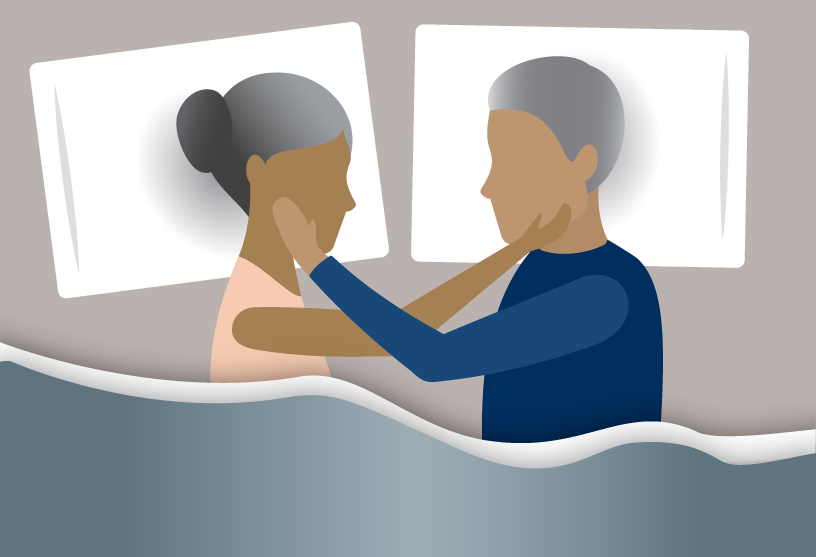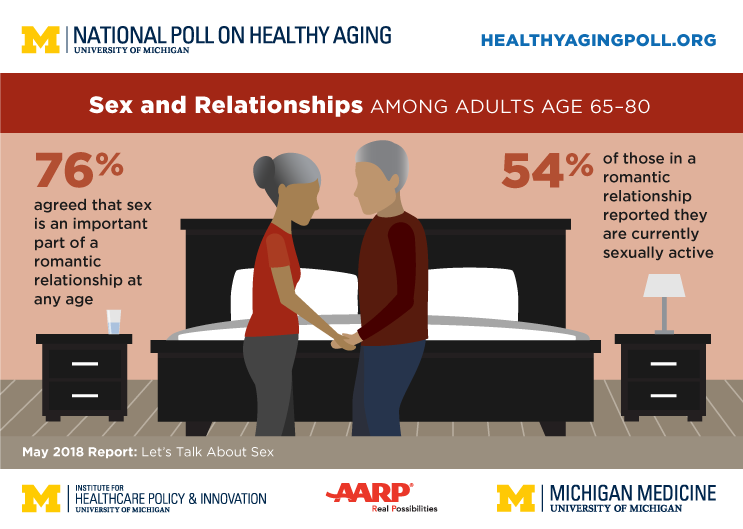“Sex after 65” in the news

How would you interpret the question, “Are you currently sexually active?” if a researcher asked you. (Please answer by posting a comment.)
Do people have sex after 60? How about after 65?
I’m often complaining that little is known about our age group’s sexual behavior and beliefs because no one asks us. So I was delighted to learn that researchers at the University of Michigan surveyed 1,002 people between 65 and 80 about their sex lives as part of the National Poll on Healthy Aging 2018. The report, titled “Sex after 65. Health, gender differences, and lack of communication,” was released on May 3, 2018.
Here are some of the findings:
- 40 percent of people between the ages of 65 and 80 are sexually active.
- 54 percent of those with a partner are sexually active.
- Nearly 2/3 of older adults say they’re interested in sex.
- More than 50% say sex is important to their quality of life.
- 73 percent said they are satisfied with their current sex life.
- 18 percent of older men and 3 percent of older women say they’ve taken medications or supplements to improve sexual function in the past two years.
- Only 17 percent of older adults said they have talked with their doctor or other health care provider about sexual health in the past two years.
- Those between the ages of 65 and 70 were nearly twice as likely as those in their late 70s to be sexually active.
- 50% of men but just 12 percent of women aged 65 to 80 said they were extremely or very interested in sex.
As I read this, I kept asking myself how they defined sex or sexually active or sex lives. Did sex with a vibrator, a partner’s hand or mouth, or one’s own hand count as sexually active or having a sex life? (I say yes.) I asked Erica Solway, Ph.D., co-associate director of the poll, who told me,
We did not define sex because we wanted the response to be based on the individual’s definition of what constitutes sex (or their sex life or being sexually active) from their own perspective. We felt this was important, but it does mean that we do not have information on what activities people were referring to when they reported they were or were not sexually active. It’s possible that two people engaged in the same activities may have responded to the questions differently based on their personal definition.
I agree that our own definition of what constitutes sex is important in a study like this — I applaud this, in fact. But I would have liked that clearer in the poll questions. For example, “Are you currently sexually active?” could have been worded, “Do you engage in sexual activity?” That may sound almost the same, but I have a hunch that many people would interpret the first question as “Do you have sex with a partner?” and the second as “Do you have sex, either with a partner or with yourself?” Asking the question differently would have raised the percentage of people who answered yes to that question, seems to me.

What do you think, readers? Am I off base? How would you interpret the question, “Are you currently sexually active?” (Please answer in the comments section.)
The wording of the questions is a minor quibble, though, because I understand that the poll was multiple-choice, not essay questions, and answered online, not via an interview. In the end, I’m happy that someone’s asking.
This report was all over the news. Here are some of the headlines:
- CNN: “Seniors, new poll says, are still sexy after all these years“
- USA Today: “Seniors and sex: Many adults ages 65-80 are having sex (and most are pretty satisfied)“
- US News: “Study: Many Adults Ages 65 to 80 Continue to Be Sexually Active“
- The Guardian: “Sex a key part of life for people over 65, study says“
- Bustle: “The Sex Lives Of People Over 65 Are Thriving, Study Finds, So There’s Finally Something to Look Forward To“
As glad as I was to see this study in the news, I couldn’t help wondering why the [younger] public is so surprised that we seniors have sex on our minds and in our beds. Why would we give up something so pleasurable? Do they expect that on some predetermined birthday, we’ll just say, “Sex? Been there, done that, moving on. Now help me blow out all these candles.”
Thank you, University of Michigan Institute for Healthcare Policy and Innovation, for conducting the study, and AARP and Michigan Medicine, U-M’s academic medical center, for sponsoring it. Let’s keep talking.
Hi Joan….Thanks to you,,,,and others,,,,but mainly you, the results of this study would be vastly different if tabulated today. Attitudes have changed and again, thanks to you, many seniors now realise that a great sex life can continue after death of a partner….illness and other setbacks in ‘ performance ‘. The vibrator of today is so much better than two years ago….and the taboos are almost gone. Yeah !!……and Thank you.
As a Certified Sexological Bodyworker/ Somatic Sex Educator, most of my clients are people in their 60s and 70s who want to continue to be sexual. I assist them in negotiating the physical and emotional changes of aging and help them find ways to do that. Despite arthritis, diabetes, heart conditions, etc., they are determined to enjoy an active erotic life. We are a new modality and people are finding there way to us and the demand far exceeds the number of available practitioners. I’m in NY state and get calls from up and down the east coast and Canada. So many people I talk to would be interested but don’t see a way; unwilling partners, fear of social or religious judgement, lack of education around their bodies and sexuality, medical practitioners who can’t or won’t discuss sexuality, etc. Things are changing among Baby Boomers and I think there is more of an expectation of continuing to be sexual. If you attend one of the growing number of group erotic events, you find lots of older adults attending, whether it’s Body Electric, Tantra workshops, etc. At 67 I am sexually active and expect to continue as such.
Interest in sex did appear to decrease with age, however, with those between the ages of 65 and 70 almost twice as likely as those in their late 70s to be explicitly dynamic, and with 33% of those in their late 60s saying they were extremely or very interested in sex, compared with 19% of those in their late 70s. It’s important for older adults to care for them to talk about these issues and about how age-related changes in physical health, relationships, lifestyles affect them.
I'm a 66, five years after prostate surgery (PCa). Wife of 40 years also 66. Erections more difficult to attain post-surgery, but possible with viagra or cialis. Takes longer. I think about sex more than she does but she's always receptive and glad we've done it especially when she has an orgasm (Duh!). Because penetrative sex with penis more difficult and that's not how she has ever gotten an orgasms, post surgery lots of finger and mouth play. As for interest, well all I need to see is her bending over and I'm usually ready. Not that we do it that often, but I sure enjoy the fantasies.
I bet many people categorize sex: With one partner. Group. Oral. Self. I think the poll should specify.
As a 60 year old male I wish I was getting more sex with my same age wife, and I know she wishes she had more of an urge, but on the whole , because I don't want to cheat on her, I'm happy with it when it happens and with masturbation in between.
When responding to surveys I often interpret "are you sexually active" to mean do you have a regular sex partner with whom you engage in penetrative sex. I assume the same about "having sex." However, if asked whether I engage in sexual activity, the response would be very different. I would assume that means the whole panoply things sexual, from fantasizing to solo sex to random hookups and partnered or multi-partnered sex of all variety.
Here's a new study — https://www.ageofmajority.com/report-doobies-dildos-and-drum-solos/. Once again, they give statistics for "sexually active" and "having sex" without defining what they mean by that!
This is unfortunate news to, say the least. I wish you had been in charge of this sexual health questionnaire.
From my past experiences, I'd assume they are referring to the very limited definition of "sex," i.e. partnered-penetrative. If I could, I'd ask what they meant by sexually active and suggest they be much more specific & precise in their future inquiries. They'd getter better data that way.
Those working with Electronic Medical Record applications are often frustrated with the limited options when taking a social/sexual history. Do they select No? Not currently? Never? (If such options are available)
Then there’s the shame/embarrassment issue about being completely honest about any sexual activity (or lack there of.)
For me, sexual activity covers the entire gamut from solo sex (masturbation, with or without sex toys) to a wide variety of sexual activities with one or more partners of any gender. Those activities might involve hands, mouths, genitals, anuses, sex toys, BDSM, and watching porn. Ultimately, my definition of sexual activity includes all actions and thoughts that produce sexual pleasures of all kinds. These activities must be consensual and must not cause harm to participants.
My penny: Men do not loose the erotic mind while the physical/sexual urge, maybe because of the lack of their male partner's in-capabilities, increases. Many of this for both sexes have to do with 'mind games'.